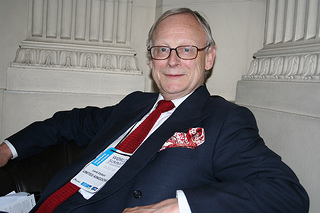Busani Bafana interviews JOHN GUMMER, President of the Global Legislators Organisation (GLOBE)
RIO DE JANEIRO, Jun 17 (TerraViva) If global leaders gathering next week for the Rio+20 conference are under immense pressure to deliver on the 1992 Earth Summit commitments, that pressure has just been doubled by parliaments taking out the environmental accountability whip.

John Gummer, (now Lord Deben), President of the Global Legislators Organisation (GLOBE). Credit: Busani Bafana/IPS
In the words of one British legislator, Barry Gardiner, “we want governments to keep their feet in the fire”.
John Gummer, (now Lord Deben), president of the Global Legislators Organisation (GLOBE), agreed.
Gummer told TerraViva on the sidelines of the first international conference of legislators underway in Rio, Brazil: “International conferences have always been meetings of ministers and chief ministers, but in the whole issue of the environment it has become increasingly true that it is the parliament and legislation organisation making decisions and pushing the agenda forward.”
Gummer said parliamentarians should make governments accountable for promises they made by signing up to international environment agreements. But parliamentarians have been kept out of the loop so that governments have got away with murder when it comes to acting on environmental issues.
“Governments have often signed up to agreements but many times do not do what they promised,” said Gummer.
Commitments to environmental agreements such as the Kyoto Protocol have varied from proaction to inaction at the expense of citizens, now more vulnerable than ever to poverty and climate change.
If governments have failed to deliver on international green agreements, where does that leave the lawmakers?
“Things are done one by one, and we have started by getting governments to realise how important these environmental issues were and Rio in 1992 itself did that over time… and Rio+10 summed up that we have not done as much as we ought to have done. Rio+20 is the moment in which we move the big stage forward and say we can do a great deal more,” Gummer told TerraViva.
Asked about what form of pressure could be exerted on governments to act, Gummer said parliaments were powerful instruments in democracies if the elected representatives did their job properly.
He cited the examples of Mexico and Britain, which have passed progressive climate change legislation. The Chinese People’s Assembly has also piled pressure on its government to implement green commitments.
“We are seeing this big change taking place and what is happening in Rio+20 is to consolidate and make sure we work together and get the best practises. GLOBE is the beginning of a powerful movement throughout the world. Legislators represent people and it is the people who are being destroyed by climate change and other assaults on the environment,” he said.
A major outcome of the four-day global summit, which has attracted 300 speakers of Parliaments, presidents of Congresses and Senates and senior legislators from all over the world, is the Rio+20 Legislators Protocol.
The protocol negotiated during the summit is based on the objectives of strengthening the scrutiny of the work of governments, supporting national legislation to advance and share best legislative practices, and incorporating natural capital accounting into national economic models to enable legislators to better monitor the use of natural capital.
.
The Rio+20 Legislators Protocol will be signed by each of delegations to uphold it and take active responsibility to press their governments to implement it. Legislators will regularly return to Rio to measure what governments have done in line with what they have committed to do.
Given that in some parts of the world, parliaments have been reduced to rubberstamps of the governments, will the protocol be enforceable?
“Yes, it is certainly enforceable in as far as the people who sign it make sure it is enforceable,” said Gummer. “Of course, some governments have very complacent parliaments but we cannot say that about the South African parliament, the British parliament and Australian parliament. What is happening in Mexico, Brazil and China and growing throughout the world is part of the democratic upsurge.
“There is no doubt the environment is something which brings people together and makes them much more active than any subject I can think of.”
GLOBE is expecting Rio+20 to enshrine the concept of natural capital to facilitate that future policies are measured not only by their effect on gross national products but also on natural capital.







 Add to Google
Add to Google







